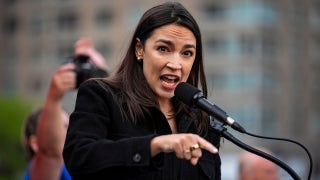Goya CEO on food supply shortages amid Russia, Ukraine war
Goya Foods CEO Bob Unanue argues that there are 'two wars raging' at the present time.
Goya Foods CEO Bob Unanue warned on "Fox & Friends Weekend" Sunday that the war between Russia and Ukraine is having a "devastating effect" on food supply as shortages are expected to contribute to higher inflation.
President Biden said last month that a food shortage is "gonna be real" following the sanctions that were placed on Russia by the U.S. government as a result of Russian President Vladimir Putin's invasion into Ukraine.
"With regard to food shortage, yes we did talk about food shortages, and it's gonna be real," Biden said during a press conference at a NATO summit in Brussels, Belgium, following a meeting with other world leaders.
"The price of the sanctions is not just imposed upon Russia," he added. "It’s imposed upon an awful lot of countries as well, including European countries and our country as well."
In response, Unanue told co-host Rachel Campos-Duffy, Sunday, that "there are two wars raging."
RISING FOOD COSTS POUNDING SHOPPERS' WALLETS; 'NO CHOICE' BUT TO INCREASE PRICES: GOYA CEO
"The first war is a war on fossil fuels and that has sent inflation skyrocketing," he said. "We are pacing seven, eight, nine, now 13% per month in our foods." He also noted that "the cost of transportation has affected every facet of the economy."
Unanue argued that the "other war is the war in Ukraine where they make a fertilizer, they make corn [and] wheat."
Russia and Ukraine account for around 29% of global wheat exports, 19% of global corn supplies, and 80% of the world’s sunflower oil exports. This reliance has many traders worried that any further military force could trigger a massive scramble by food importers to replace supplies normally sourced from the Black Sea region.
Russia is also one of the world’s biggest exporters of all three major groups of fertilizers.
"They also have sand for glass and also for fracking," Unanue said, speaking of Russia and Ukraine. He said that "that’s all being blocked in the ports of Odessa," which is impacting supply and prices.
While he stressed that the war "is having a devastating effect on supply," he argued that "the real problem" with the supply chain started with the COVID lockdowns.
FOX NEWS POLL: BIDEN'S INFLATION TROUBLES PERSIST AS VOTERS CITE HIGH GAS PRICES, SPENDING WOES
Inflation hit a fresh 40-year high in February with the consumer price index climbing 7.9% on an annual basis, according to data released last month by the Bureau of Labor Statistics. Month over month, inflation rose 0.8%.
The year-over-year reading is in line with estimates and compares with an annual 7.5% jump in January, marking the fastest increase since February 1982, when inflation hit 7.6%.
From January to February, nearly every category of goods and services got pricier. Gas jumped 6.6% and accounted for almost a third of price hikes. Grocery costs jumped 1.4%, the sharpest one-month increase since 1990, other than during a pandemic-induced price surge two years ago. The cost of fruits and vegetables rose 2.3%, the largest monthly increase since 2010.
For the 12 months ending in February, grocery prices leaped 8.6%, the biggest year-over-year increase since 1981, the government said. Gas prices are up a whopping 38%. And housing costs have risen 4.7%, the largest yearly jump since 1991.
Inflation data for March will be released next week. The February data, the latest data currently available, was taken before Russia's invasion of Ukraine, which pushed prices for some commodities higher. The costs of wheat, corn, cooking oils and such metals as aluminum and nickel have soared since the war began as Ukraine and Russia are leading exporters of those commodities.
As inflation rises, meat and poultry prices are largely expected to continue their climb in the U.S. this year, according to a new analysis.
Evercore ISI issued a protein inflation note last week projecting that most protein prices are forecasted to increase "substantially" due to the higher feed costs, with chicken breast reaching as high as 70% year-over-year in the first half of 2022.
Unanue noted on "Fox & Friends Weekend" that beans are a good protein substitute for those trying to save amid the inflationary environment.
"Usually the red, the black, they are hire in antioxidants," he said. "Beans have protein, fiber, antioxidants vital nutrients and when you combine [them] with rice you get a complete protein."
CLICK HERE TO GET THE FOX NEWS APP
"It’s a pretty economical and [a] full meal," Unanue added.
FOX Business’ Breck Dumas, Lydia Hu and Sumner Park as well as Fox News’ Kyle Morris and The Associated Press contributed to this report.













































